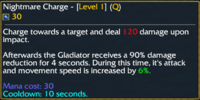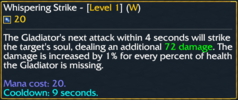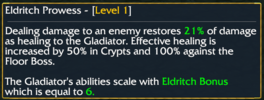- Joined
- Mar 9, 2023
- Messages
- 69
Hello! I'm doing a dynamic description system for crunchy tooltips. It's called every 6th seconds and works like a charm. However, what ways can I improve it?
I'm thinking that I don't actually need to use a string array. I could just have it be a local string that's being declared, and subsequently change
this line.
Also, is it worth declaring a local unit variable instead of referencing the global unit variable like I'm doing now?
Anything more I could improve? Thanks!
UPDATE
I adapted to Uncle's solution! Thanks to this, my functions are less spread out. Also, I did not think of converting the math variables into strings before "printing" them, which is super helpful.
GladiatorSetup is called when the Gladiator hero is picked and passed along. E.g.
I currently call all three updates at the same time, every 6 seconds because that's when I update the Gladiator's Eldritch Bonus variable.
First: I have a function which handles the Eldritch Bonus:
After setting the bonus, it calls the handler. The handler will update all functions that depend on the Eldritch Bonus.
Note that I am calling the same function thrice with different input. Here is an area to improve my handler.
1. I could add checks to not have to call make all calls in case they are not learned. But since we instantly return if the ability is not learned, it shouldn't be a large concern.
2. I could just call the GladiatorUpdateAbility function and make it update all learned abilities. Here's how it could look like:
Which means that we only call it once in the handler without passing any arguments.
Both ways of doing it works. If we're updating a single ability's description during specific events, such as ability level up, then the first solution to update a single description is better. For updating all at once, the second one will be helpful, yet it will obviously look more cluttered since we're repeating the same code in multiple if-statements.
Any concerns about the code? Would you have done it differently?
JASS:
globals
string array gladQ
endglobals
function GladDescriptionQ takes nothing returns nothing
local unit u = gladiatorHero
local integer abilityId = 'A05F'
local ability a = BlzGetUnitAbility(u, abilityId)
local integer i = GetUnitAbilityLevel(u, abilityId)
set gladQ[i - 1] = "Charge towards a target and deal |c00ff0000" + I2S(R2I(eldritchBonus * 16 + (i*4))) + "|r damage upon impact.|n|nAfterwards the Gladiator receives a 90% damage reduction for 4 seconds. During this time, its attack and movement speed is increased by|cff00ff00 " + I2S(MathRound(R2I(eldritchBonus))) + "%.|r|n
|c0000ffffCooldown: 10 seconds.|c006666ff
Mana: " + I2S(25 + i*5) +".|r |n|n"
call BlzSetAbilityExtendedTooltip(abilityId, gladQ[i - 1], i - 1)
call IncUnitAbilityLevelSwapped(abilityId, u)
call DecUnitAbilityLevelSwapped(abilityId, u)
endfunctionI'm thinking that I don't actually need to use a string array. I could just have it be a local string that's being declared, and subsequently change
JASS:
call BlzSetAbilityExtendedTooltip(abilityId, gladQ[i - 1], i - 1)Also, is it worth declaring a local unit variable instead of referencing the global unit variable like I'm doing now?
JASS:
local unit u = gladiatorHeroAnything more I could improve? Thanks!
UPDATE
I adapted to Uncle's solution! Thanks to this, my functions are less spread out. Also, I did not think of converting the math variables into strings before "printing" them, which is super helpful.
vJASS:
library Gladiator
globals
unit gladiatorHero = null
real eldritchBonus = 0.0
private integer array heroAbility
endglobals
private function GladiatorUpdateQ takes integer lvl returns string
local string damage = I2S(R2I((lvl * 4 + 16) * eldritchBonus))
local string speed = I2S(MathRound(R2I(eldritchBonus)))
local string mana = I2S(25 + lvl * 5)
local string s = "Charge towards a target and deal |c00ff0000" + damage + "|r damage upon impact.|n|nAfterwards the Gladiator receives a 90% damage reduction for 4 seconds. During this time, its attack and movement speed is increased by |cff00ff00" + speed + "%.|r|n|n|c006666ffMana cost: " + mana + "|n|c0000ffffCooldown: 10 seconds.|r"
set damage = null
set speed = null
set mana = null
return s
endfunction
private function GladiatorUpdateW takes integer lvl returns string
local string damage = I2S(R2I(eldritchBonus * (10 + 2*lvl)))
local string cooldown = I2S(10 - lvl)
local string s = "The Gladiator's next attack within 4 seconds will strike the target's soul, dealing an additional |cff00ff00" + damage + " damage|r. The damage is increased by 1% for every percent of health the Gladiator is missing.|n|n|cff8080ffMana cost: 20.|r|n|cff00ffffCooldown: " + cooldown + " seconds.|r"
set damage = null
set cooldown = null
return s
endfunction
private function GladiatorUpdateE takes integer lvl returns string
local string lifesteal = I2S(R2I(15 + eldritchBonus))
local string eBonus = I2S(R2I(eldritchBonus))
local string s = "Dealing damage to an enemy restores |c0000ff00" + lifesteal + "%|r of damage as healing to the Gladiator. Effective healing is increased by 50% in Crypts and 100% against the Floor Boss.|n|nThe Gladiator's abilities scale with |c0000ff00Eldritch Bonus|r which is equal to |c0000ff00" + eBonus + ".|r"
set lifesteal = null
set eBonus = null
return s
endfunction
function GladiatorUpdateAbility takes integer abilityIndex returns nothing
local integer id = heroAbility[abilityIndex]
local integer lvl = GetUnitAbilityLevel(gladiatorHero, id)
if (lvl == 0) then
return
endif
if (id == heroAbility[0]) then
call BlzSetAbilityExtendedTooltip(id, GladiatorUpdateQ(lvl), lvl - 1)
elseif (id == heroAbility[1]) then
call BlzSetAbilityExtendedTooltip(id, GladiatorUpdateW(lvl), lvl - 1)
elseif (id == heroAbility[2]) then
call BlzSetAbilityExtendedTooltip(id, GladiatorUpdateE(lvl), lvl - 1)
endif
call IncUnitAbilityLevelSwapped(id, gladiatorHero)
call DecUnitAbilityLevelSwapped(id, gladiatorHero)
endfunction
function GladiatorSetup takes unit u returns nothing
set gladiatorHero = u
set heroAbility[0] = 'A05F' // Q
set heroAbility[1] = 'A0D9' // W
set heroAbility[2] = 'A05E' // E
endfunction
endlibraryGladiatorSetup is called when the Gladiator hero is picked and passed along. E.g.
JASS:
//function for checking picked hero
if hero_id == 'N03M' then //Unit type id of the hero
call GladiatorSetup(u)
endifI currently call all three updates at the same time, every 6 seconds because that's when I update the Gladiator's Eldritch Bonus variable.
First: I have a function which handles the Eldritch Bonus:
JASS:
function GladDesc_Actions takes nothing returns nothing
// declare locals
if gladiatorHero == null then
return
else
if GetUnitAbilityLevel(gladiatorHero, 'A05E') >= 1 then // If hero exists, but hasn't grabbed the ability yet then we don't do anything
// Eldritch Bonus code
call GladDesc_Handler() //We call handler to update the descriptions
endif
endif
endfunctionAfter setting the bonus, it calls the handler. The handler will update all functions that depend on the Eldritch Bonus.
JASS:
//Locals and other calls
call GladiatorUpdateAbility(0)
call GladiatorUpdateAbility(1)
call GladiatorUpdateAbility(2)Note that I am calling the same function thrice with different input. Here is an area to improve my handler.
1. I could add checks to not have to call make all calls in case they are not learned. But since we instantly return if the ability is not learned, it shouldn't be a large concern.
2. I could just call the GladiatorUpdateAbility function and make it update all learned abilities. Here's how it could look like:
JASS:
function GladiatorUpdateAbility takes nothing returns nothing
local integer lvl = 0
if GetUnitAbilityLevel(gladiatorHero, heroAbility[0]) >= 1 then
set lvl = GetUnitAbilityLevel(gladiatorHero, heroAbility[0])
call BlzSetAbilityExtendedTooltip(heroAbility[0], GladiatorUpdateQ(lvl), lvl - 1)
call IncUnitAbilityLevelSwapped(heroAbility[0], gladiatorHero)
call DecUnitAbilityLevelSwapped(heroAbility[0], gladiatorHero)
endif
if GetUnitAbilityLevel(gladiatorHero, heroAbility[1]) >= 1 then
set lvl = GetUnitAbilityLevel(gladiatorHero, heroAbility[1])
call BlzSetAbilityExtendedTooltip(heroAbility[1], GladiatorUpdateW(lvl), lvl - 1)
call IncUnitAbilityLevelSwapped(heroAbility[1], gladiatorHero)
call DecUnitAbilityLevelSwapped(heroAbility[1], gladiatorHero)
endif
if GetUnitAbilityLevel(gladiatorHero, heroAbility[2]) >= 1 then
set lvl = GetUnitAbilityLevel(gladiatorHero, heroAbility[2])
call BlzSetAbilityExtendedTooltip(heroAbility[2], GladiatorUpdateE(lvl), lvl - 1)
call IncUnitAbilityLevelSwapped(heroAbility[2], gladiatorHero)
call DecUnitAbilityLevelSwapped(heroAbility[2], gladiatorHero)
endif
endfunctionWhich means that we only call it once in the handler without passing any arguments.
JASS:
call GladiatorUpdateAbility()Both ways of doing it works. If we're updating a single ability's description during specific events, such as ability level up, then the first solution to update a single description is better. For updating all at once, the second one will be helpful, yet it will obviously look more cluttered since we're repeating the same code in multiple if-statements.
Any concerns about the code? Would you have done it differently?
Attachments
Last edited:













